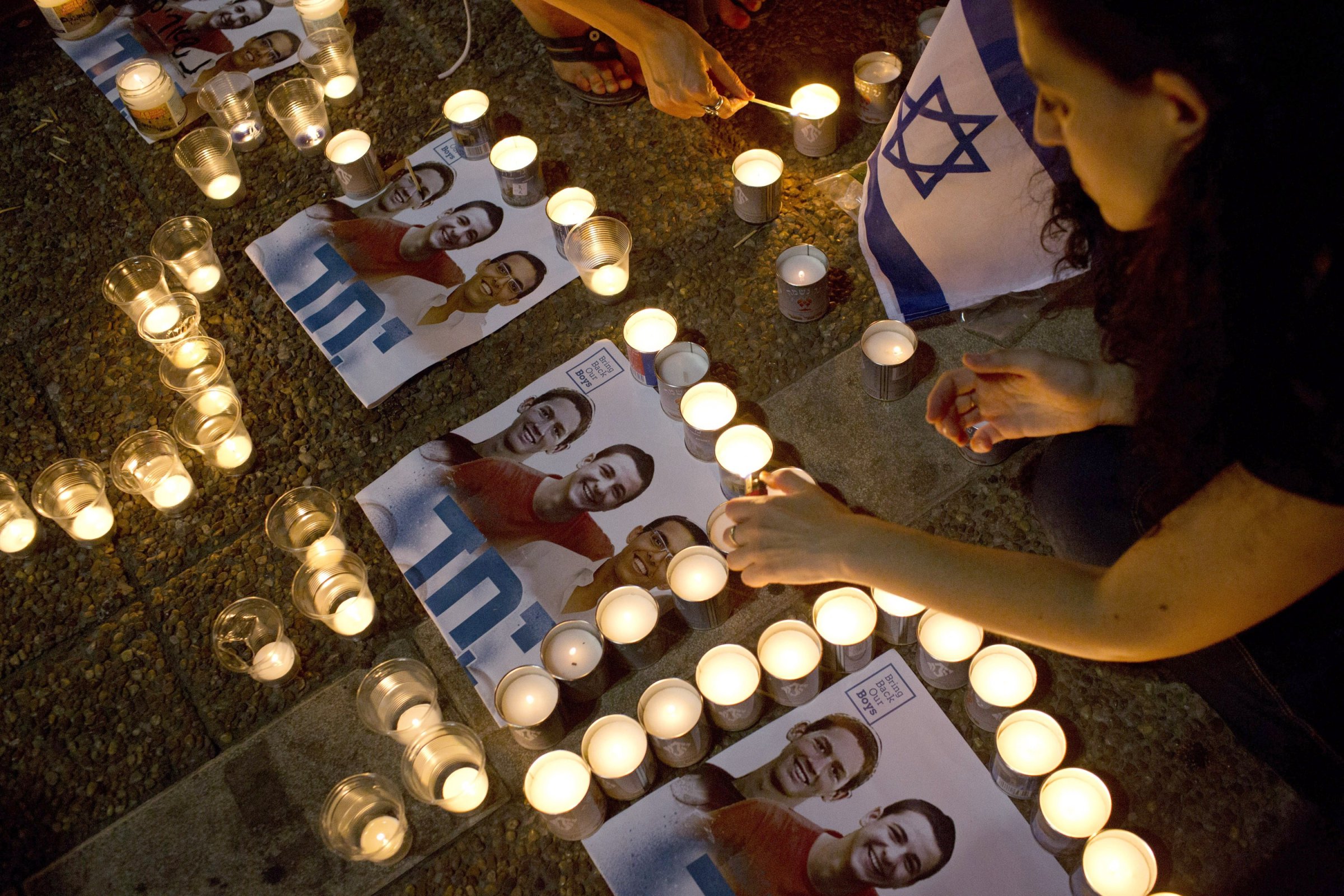
The bodies of three Israeli teenagers kidnapped while hitchhiking this month were found on Monday afternoon in a field a few miles south of where they were last seen, the Israeli military said.
The discovery brought to a tragic close the intense search and nationwide vigil for Eyal Yifrach, 19; Naftali Fraenkel and Gilad Shaer, both 16, all students at Jewish religious schools located on the occupied West Bank. It also shifted to the foreground the question of how Israel will respond to the deaths, which Prime Minister Benjamin Netanyahu blames on Hamas, the militant Islamist group. After news that the bodies had been found in an open field north of Hebron, Netanyahu summoned senior ministers to an emergency meeting of the so-called security cabinet.
Netanyahu made some brief remarks at the beginning of the meeting. “They were kidnapped and murdered in cold blood by animals,” he said, according to Haaretz. “In the name of the whole of Israel, I ask to tell the dear families — to the mothers, the fathers, the grandmothers and the grandfathers, the brothers and sisters — our hearts are bleeding, the whole nation is crying with them. We will bring the boys to be buried according to Jewish rites.”
“Hamas is responsible, and Hamas will pay,” the Prime Minister added.
Israel already has struck hard at Hamas, tripling the number of troops on the West Bank in what was the largest military operation in the area in a dozen years. Officials said they wanted to wound Hamas as an organization — by arresting scores of its activists and shuttering its social-service outlets on the West Bank, while pounding militant targets in the Gaza Strip, which Hamas has governed since 2007. In recent days, rockets from the Gaza Strip have been flying toward Israel.
Netanyahu made clear he also wanted to coerce the more moderate Fatah party to dissolve a governing partnership that had been put in place only two weeks earlier, in the form of a cabinet of technocrats at the Palestinian Authority (PA). But the effort to influence Palestinian politics was greeted skeptically on the West Bank, where the Israeli military operation was seen more as a bludgeon than an effort to recover the missing teens. PA President Mahmoud Abbas, who heads Fatah, was criticized for condemning the kidnapping and directing Palestinian security services to assist in the search.
In Israeli security circles, the investigation turned grim early. The discovery of a burned sedan outside Hebron the morning after the teens went missing was received with foreboding: fires can erase evidence, and Hebron would be the likeliest direction abductors would head. Other directions would take them closer to concentrations of Israeli security, and the city is both the largest on the West Bank, and a stronghold of Hamas. Forensic examination of the vehicle produced spent bullets and traces of blood. The amount could not be detected, however, nor the type, let alone DNA. Absent the presence of bodies, the news was initially withheld from the families. But investigators hypothesized that at least one of the youths had been killed within minutes inside the car, and likely all three.
Authorities also zeroed in on suspects soon after the abduction — two young Palestinians who were known to be active in Hamas, and had disappeared the night the teens went missing. Marwan Quasma, 29, and Amar Abu Eisha, 32, are thought to be in hiding separately. Quasma is from a notoriously militant Hebron clan that, in the past, has reportedly been known to operate beyond the control of Hamas leaders.
U.S. President Barack Obama issued a statement on Monday extending his condolences to the three teenagers’ families. “The United States condemns in the strongest possible terms this senseless act of terror against innocent youth,” he said. “I also urge all parties to refrain from steps that could further destabilize the situation. As the Israeli people deal with this tragedy, they have the full support and friendship of the United States.”
— With reporting by Aaron J. Klein / Tel Aviv
More Must-Reads From TIME
- The 100 Most Influential People of 2024
- The Revolution of Yulia Navalnaya
- 6 Compliments That Land Every Time
- What's the Deal With the Bitcoin Halving?
- If You're Dating Right Now , You're Brave: Column
- The AI That Could Heal a Divided Internet
- Fallout Is a Brilliant Model for the Future of Video Game Adaptations
- Want Weekly Recs on What to Watch, Read, and More? Sign Up for Worth Your Time
Contact us at letters@time.com